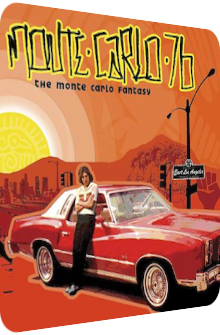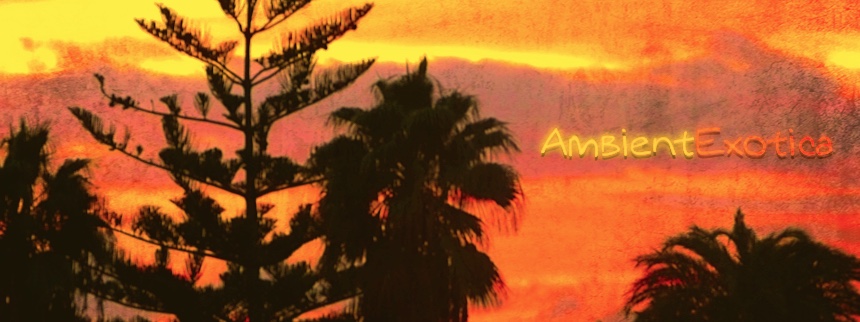
Monte Carlo 76
The Monte Carlo Fantasy
2004
The Monte Carlo Fantasy is the eight-track debut of the duo Monte Carlo 76 aka guitarist and composer Jeremy Keller as well as multi-instrumentalist and composer Dgomez, released in 2004 on the Nomadic Sound System label. It has to be said right at the beginning: one look at the tracklist – and, of course, the year of its release –, and the vintage Exotica fan groans in disdain. I can relate, there is premonition in the air, for the duo invites many a guest musician and vocalist to ennoble the soundscapes, thus nurturing the interim conclusion to think of it as “one of those albums” which are frilly, slick and over-produced, with each track throwing the listener into a new scenery. Thankfully, and unexpectedly at that time, The Monte Carlo Fantasy is a very focused and masterfully stringent work whose dreamlike state lives up to the title.
Two main ingredients are part of every arrangement: guitars and organs. In tandem with bongos, other drums and polyphonic vocals, Monte Carlo 76 create a hybrid oscillation between Lounge lands, Dream Pop deserts, Latin vestibules, Exotica traces and scents from the second generation of Dub records, namely those of the electronic kind. The predominant mood and timbre are equally impressive. All tracks evoke a simmering heat wave of the utmost dry kind (in contrast to, say, Jan Jelinek & Masayoshi Fujita’s Do You Know Otahiti? from 2013 whose heat is moist, tropical and drowned in vibraphone drones). Read on to know more about a surprising record that deserves this belated praise and which is really, truly not as stereotypical or clichéd as one might imagine by the first look of things.
The remark to drop in the Atomic Age comes in the form of a track: God Has Pulled The Plug On Us is a remarkably shimmering and dreamy track, one of those archetypical millennial Lounge productions with those deep electronic bass billows, reverberated afterglow of the synths, multitudes of mellow guitar aortas and silkened shakers. The midtempo number is more than just a great gateway into the album though: it really emits dusty roads, a sunset-colored Vegas atmosphere or an Arizona-based layering technique. Best of all is the focus; despite the cosmic bits and galactic coils, everything feels peaceful, encapsulating and positively slick. A sudden trip into sunbaked vacation lands is realized via Rowley Park, a mildly camouflaged Cha Cha Cha critter whose vestiges – croaking guiros and the mandatory three-tone "cha cha cha" shrapnel – are still woven into Dgomez’ acoustic guitar-driven vocals. A track supercharged with euphony, aural rays of light and a tasteful mellifluousness, Rowley Park unites Pop with positively calcined Latinisms and that paradisiac harmony of Exotica.
The follow-up The Monte Carlo Fantasy features the Spanish accent of Rafael Maestro Cardenas who tells his tales of swimming, barbecues and the essential constituents of his titular fantasy over pulsating asbestus-alloyed dark matter pads which cannot kill off the gorgeous euphony that wafts around their molecules like a summer breeze, and indeed, what is already hinted at in the interstices is then realized in various segues, namely a rural sepia-toned mélange of Jeremy Keller’s Dream Pop guitar veil and Dgomez’s ardent organ plateaus. Everything feels deliberately fuzzy and golden.
While the tropical Joker admixes the same moiré of eminently warm guitar formations to a chaparral of aqueous bongos, wah-wah guitars and piano glissandos which altogether form the scenery for Martha Gonzales to sing the story about her eponymous friend with the help of a humming backing choir, Strawberry Pak Days, La Fiesta is one sleazy instrumental specimen loaded with that wonderfully atavistic post-Rave wonkiness as delivered by Dgomez’ quavering organs, an elasticized guiro skeleton as well as bongo blebs. Melancholia, diffuse heat and and longing are all united here, as is a shapeshifting beat structure in a short intersection which sports a revved up percussion coppice.
The Unofficial Theme To Always Running is next and may hint at a breakneck tachycardia, but in reality is a well-groomed city-strolling beat with a great plasticity: the very short sustain, echo and depth of the parallax percussion thicket and drum diorama are very effective in delivering the playboy vocals by Jon Wahl who can hide in shadows and from hills, but not from himself. Running from one’s self is but one of the many topics that sit in the outer rims of the inebriated Lounge scene, so this is almost too contemplative and pondering a topic, but splendidly realized thanks to the bone-dry electric guitars and yet another mirage of heat waves spawned near Dgomez’s Hammod organ.
It is also this very gentleman who showcases his skills as a multi-instrumentalist in the following So Close To Gardena, So Far From God, the latter entity of whom famously pulled the plug in the opener. Anyway, Dgomez’s impression on the harmonica make him utterly suitable for The Orb’s 1992 anthem Towers Of Dub (careful: this link leads to the ominous Ambient section of AmbientExotica!), as these bucolic elements work enormously well with the organ rivulets and Clouseaux-like hums of the backing choir. Deep bass guitars round off another fine reverie before the magnificent finale Mi Fantasia ends things with a clinging bang. Japan-oid cyber-driven guitar-and-organ sequences face clashing cymbals, a hi-hat galore and an uplifting free flow to die for. This is a divine hit co-written with Olmeca which ennobles everything. It gleams, features glowing overtones and has that certain amount of perceived improvisation that make it feel just right. Shuttling between Rock, high-rise megacities and ethereal transcendence, Mi Fantasia is one hell of a hel(l)ical closer.
With The Monte Carlo Fantasy, Monte Carlo 76 do one crucial thing incredibly right, one that is often amiss in synergetic Fusion works released after the millennium: cohesion and stringency. Whenever a new band or collective comes up with a debut, it tries to embroider various styles, influences and sub-themes or tailors the tunes to meet the demands, characteristics and strengths of the partaking guest musicians or vocalists, because who knows whether a band's first album will already be their last in these harsh times. Here, everything is different in this regard, and the fact that the partaking musicians are able to co-write and alter the compositions is only the tip of the iceberg, notwithstanding the fact that creating music is a mutual undertaking. Even more impressive is the precise focus on a textural base frame or blueprint: throughout each of the eight tracks, a simmering heat is created via blurred guitar twangs and a lava-like organ fluxion. Ardor, moisture and tropical heat are the constants.
Together with the melancholic and beatific structures, they definitely do create fibers which form whole phantasms, fantasies, figments. I am not implying that all songs sound identical, however, their pool of textures is alike enough to create a flow, a flume through which the electrons and acoustrons are pressed. Highlights include the bongo-accompanied Strawberry Pak Days, La Fiesta, the Dream Pop side quest Rowley Park and, of course, the translucent gemstone-covered mountain range Mi Fantasia. All in all, The Monte Carlo Fantasy is a strong debut in hindsight, definitely exotic enough to be included here in this section, and blooming effervescently. Those who seek variety and everchanging patterns in each and every track can look almost anywhere else; here, however, unity and balance reign, and these cause delight even a decade after its release.
Exotica Review 388: Monte Carlo 76 – The Monte Carlo Fantasy (2004). Originally published on Nov. 8, 2014 at AmbientExotica.com.
